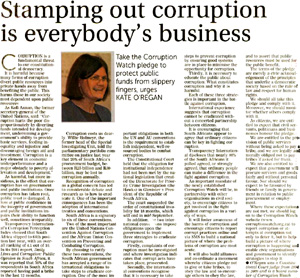|
Getting your Trinity Audio player ready...
|

Take the Corruption Watch pledge to protect public funds from slippery fingers, urges Kate O’Regan in the Business Times.
Corruption is a fundamental threat to our constitutional democracy. It is harmful because many forms of corruption divert public resources into private hands away from benefiting the public. This harms those in our society most dependent upon public resources.
As Kofi Annan, the former secretary-general of the United Nations, said: “Corruption hurts the poor disproportionately by diverting funds intended for development, undermining a government’s ability to provide basic services, feeding inequality and injustice and discouraging foreign aid and investment. Corruption is a key element in economic underperformance and a major obstacle to poverty alleviation and development.”
As harmful, but more insidious, is the effect that corruption has on government and public institutions. Once corruption has taken root, public trust is damaged. A loss of public confidence in the integrity of government and public institutions impairs their ability to function well, sometimes irreparably.
Transparency International’s Corruption Perception Index showed that South Africa slipped to 64th position last year, with an overall ranking of 4.1 out of 10. In its 2011 report, Daily Lives and Corruption: Public Opinion in South Africa, it was reported that 56% of the respondents in South Africa reported having paid a bribe in the last 12 months.
Corruption costs us dearly. Willie Hofmeyr, the former head of the Special Investigating Unit, told the parliamentary portfolio committee on justice last year that 20% of South Africa’s procurement budget, between R25-billion and R30-billion, may be lost to corruption annually.
Recognition of corruption as a global concern has led to considerable debate and research as to how to eradicate it. One of the important consequences has been the adoption of international treaties and conventions. South Africa is a signatory to six of these conventions. Two of the most important are the United Nations Convention Against Corruption and the African Union Convention on Preventing and Combating Corruption.
By choosing to ratify these two conventions, the South African government has accepted a range of international obligations to take steps to eradicate corruption. One of the most important obligations in both the UN and AU conventions is the requirement to establish independent, well-resourced bodies to combat corruption.
The Constitutional Court held that the obligation for institutional independence had not been met by the national legislation that created the Directorate for Priority Crime Investigation (the Hawks) in Glenister v President of the Republic of South Africa.
The court suspended the order of constitutional invalidity for 18 months, which will end in mid-September. In addition, the two international conventions impose obligations upon the government to implement three strategies to eradicate corruption.
Firstly, complaints of corruption must be investigated and where investigation indicates that corrupt acts have taken place, prosecuted. Secondly, the international conventions recognise that it is necessary to take steps to prevent corruption by ensuring good systems are in place to minimise the opportunity for corruption. Thirdly, it is necessary to educate the public about corruption: What constitutes corruption and why it is harmful.
Each of these three strategies is important in the battle against corruption. International experience suggests that corruption cannot be eradicated without a concerted partnership between citizens.
It is encouraging that South Africans appear to agree that ordinary citizens can be key in fighting corruption. Transparency International discloses that nearly 80% of the South Africans it polled agreed, or strongly agreed, that ordinary people can make a difference in the fight against corruption.
An important mandate of the newly established Corruption Watch will be, in partnership with other organisations in civil society, to encourage citizens to get involved in the fight against corruption in a variety of ways. It will foster awareness of the harms of corruption and encourage citizens to report corrupt practices online and via SMS to build a national picture of where the problems of corruption are most acute.
It will also build alliances and co-ordinate a movement whereby citizens pledge not to give or take bribes, to obey the law and to encourage others to obey the law, and to assert that public resources must be used for the public benefit. The terms of the pledge are merely a civic acknowledgement of the principles that underlie a democratic society based on the rule of law and respect for human rights. We should all take this pledge and comply with it.
Moreover, we should monitor whether others comply with it. As citizens, we are entitled to expect that civil servants, politicians and businesses honour the pledge. We are entitled to the provision of public services without being asked to pay a bribe, and we are legally and morally obliged not to pay bribes if asked for them.
We are also entitled to expect that government will procure services and goods fairly and without personal favour. Nor should we expect to be favoured by friends or family in government in relation to public procurement or employment.
Where these expectations are not met, we should log on to the Corruption Watch website (www.corruptionwatch.org.za) to report corruption or attempts at corruption not only to deter it, but to help build a picture of where corruption is happening and enable civic organisations and government to identify strategies to stop it.
Kate O’Regan was a Constitutional Court judge from 1994 to 2009 and is a board member of Corruption Watch. Sign the Corruption Watch pledge. This article originally appeared in the Sunday Times Business Times on 29 January 2012.

Take the Corruption Watch pledge to protect public funds from slippery fingers, urges Kate O’Regan in the Business Times.



